project
The proposal to create the Intercontinental Academia was brought up during the meeting of the Coordination Committee of Ubias (University-Based Institutes for Advanced Studies - a network between national institutes of advanced studies of 34 universities around the world), held in March 2012 at the Institute for Advanced Study Jawaharlal Nehru, in New Delhi, India. The initial idea was of the then director of the IAS of the Hebrew University of Jerusalem, Israel, Eliezer Rabinovici, who has visited the IEA-USP twice. The IEA-USP and the IAR (Institute for Advanced Research) of the University of Nagoya felt motivated by the insight of the Israeli scientist and decided to be behind the pilot project for this initiative, which operates as a joint venture.
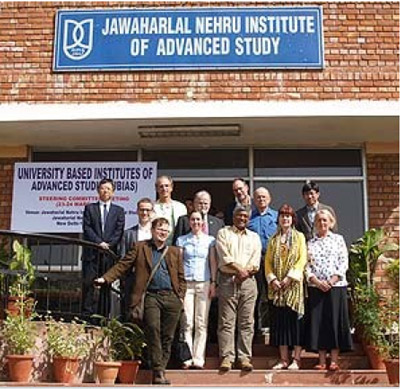 | |||||||
|---|---|---|---|---|---|---|---|
| The members of UBIAS's Coordinating Committee during the meeting in New Delhi, India. |
The project has been structured since then, either at a distance or when physical meeting between the representatives of the IEA-USP and the IAR-Nagoya were possible. Professors Dapeng Cai and Susumo Saito, both from the IARNagoya, visited the IEA-USP in February 2013 in order to share ideas and discuss the future of the project in a working meeting with representatives of USP's Agency for National and International Academic Cooperation, members of IEA-USP's Board and members of research groups of the institute.
The meeting of UBIAS's directors at the Hebrew University of Jerusalem in March, 2013, marked a new level of involvement with the project because after further conversations the executive coordinator of FRIAS (IAS of the University of Freiburg, Germany), Carsten Dose, became secretary of the Intercontinental Academia.
Finally, after extensive distribution through UBIAS, the conference of the network in September 2013, held at the University of British Columbia in Vancouver, Canada, reserved a special place in its agenda for the presentation and discussion of the project. The institutional commitment became even more evident with the participation interests demonstrated by representatives of the IAS's of the University of Helsinki, Finland, the University of Western Australia, Perth, Australia, and the Hebrew University of Jerusalem. At that time, a letter of intent was signed by the directors of both sponsors for the first edition of the Intercontinental Academia: IEA-USP and IAR-Nagoya.
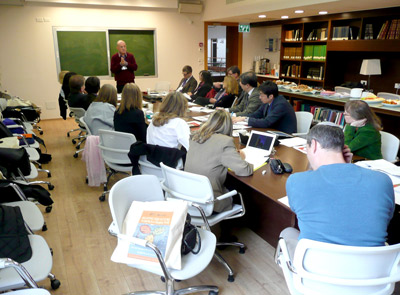 | 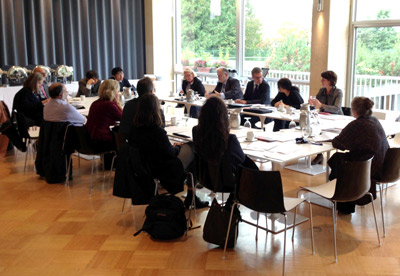 |
|---|---|
| Eliezer Rabinovici, former director of the IAS of the Hebrew University of Jerusalem, speaks to the participants at the meeting of directors of the UBIAS network in March, 2013. | Steering Committee Meeting during the international UBIAS conference in Vancouver, in September, 2013. |
The proposal is to promote scientific exchange between generations, disciplines, cultures and continents, investing particularly in young scientists aged between 30 and 40 years from different areas of knowledge to engage in an interdisciplinary collaborative study under the guidance of three senior scientists - of regional and international recognition - which will coordinate the activities. For this, there will be selected 15 researchers from several universities in the world that keep an UBIAS member IAS on its chart.
The group will be in touch during the biennium of the project and will gather in two workshops of twenty days each - one in São Paulo, originally scheduled for March, 2014, but rescheduled to March, 2015, and another in Nagoya, scheduled for September, 2015. On these immersive meetings, the researchers will have the chance to discuss the researched topic through lectures, readings, workshops and discussions, besides sharing experiences, and participating in intercultural activities and social programme.
The exchange of information will take place not only among the selected participants, but also in their local scientific communities, offering contact to worldwide science, culture and research projects of excellence.
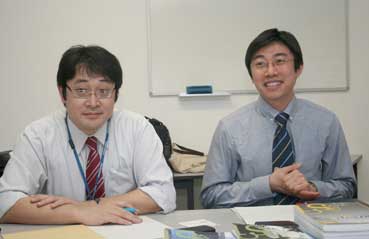
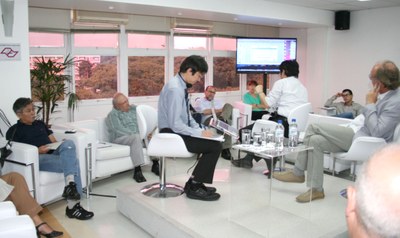
Professors Susumo Saito and Dapeng Cai, of the IAR-Nagoya, in two different moments of their visit to the IEA-USP in February, 2013.
Other highlights of the schedule of the Intercontinental Academia will be the period of the Open Call between June 2 and July 13, 2014, and the month of October of the same year, in Germany, when representatives of the member IASs of UBIAS will decide on the participants for the project together.
Each one of the 34 UBIAS-member IASs will indicate, on average, three names of high relevance among young researchers in their your locality. From this group of approximately 100 names, 15 will be selected, keeping the proposal to establish a mosaic of different areas of knowledge and nationalities.
The expectation of Martin Grossmann, director of the IEA-USP, is that the Intercontinental Academia will act as a laboratory for future university-level collaborative work. "It is a small-scale project, but has the potential to bring about a new format in higher education.” The term ‘academy’ may have a pejorative overtone, since it is used to refer to the body of great names in science who admittedly generated quality knowledge, but were uncommitted to transforming prevalent thoughts. “However, in the sense used at the Intercontinental Academia, the term refers to a cutting edge environment, an experimental space for discussions, risk-taking and fostering unexpected encounters,” he stressed.
According to Dapeng Cai, this type of initiative is very important because “university research is overly focused and specialized, and researchers fail to share languages, do not relate to other fields, and forget how to communicate with each other.” The economist noted that the Intercontinental Academia will be guided by three goals: to stimulate joint research among Ubias members; to establish cooperation networks among the next generation’s scientific leaders; and to explore new forms of collective academic practices and new formats of scientific training, collaboration and dissemination.



